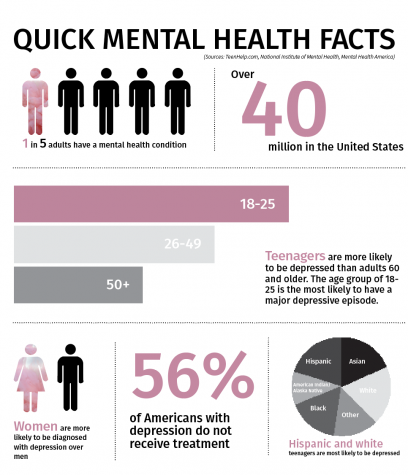Your donation will support the student journalists of Francis Howell North High School. Your contribution will allow us to purchase equipment and cover our annual website hosting costs.
Credit to Alex Rowe
Many students are affected by depression. Others don’t always understand the influence of depression and other mental illnesses on teenagers, and how they affect students’ academics, relationships and growth.
Q&A: Counselor Ann Herman
Published: December 20, 2017
 Photographer McKayla Bogda
Photographer McKayla Bogda
What should students know about depression if they don’t have it themselves?
I would say that depression is not an uncommon experience, and that it can affect anybody at any stage of their life. It’s important that we understand it to help remove any stigma that people fear might be attached to it.
What are some misconceptions about depression?
Some common misconceptions are that it is something that you can just get over, that if you just think happy thoughts, it will go away and that it only affects people that have bad things happening to them in their life.
What are the signs of depression?
The signs of depression can vary according to the person, but some common signs we see, especially at the teenage stage, would be things like withdrawing from friends and withdrawing from activities that somebody once found fun and enjoyable. It might include things like feeling sad or irritable. Sometimes, we might see an impact on grades or a sudden change in activity or performance for that student.
How should students respond when they find out someone has depression?
I think as a general rule, it’s always appropriate to be supportive of the person, to offer to be there as a person if they feel like they want to talk. But also, because we are talking about teenagers, it is also important that the friend does not feel responsible to carry that burden by themselves, so I think talking to an adult or encouraging their friend to talk to an adult is extremely important and not being afraid that your friend is going to be angry because you went to an adult to try to get them help.
What should students do to understand depression?
I think some of the signs are taught here at school in different classes like health and psychology and even some of the counseling lessons that we do here in the school. There are a lot of other resources out there in the community and online, and I would just encourage students to try to learn more about it through those resources, so they can be a support for anybody in their life that is going through that.
At what point should students bring the issue to an adult if they notice any of the signs of depression in another student?
I think it’s always a good idea to bring it to the attention of an adult to try to help get resources and support and help for a friend, but definitely if you have any concern at all that the person has any self-harming thoughts. That’s where I would want a student to never worry about getting their friend in trouble because that won’t happen, or their friend being angry with them because the priority is keeping their friend safe.
If a student does want to help their friend, where should the student go?
I would say any trusted adult, so if it is here at school, they could talk to a teacher, a counselor, a principal. If it’s outside of school, their parents, their friend’s parents or even calling one of those hotlines.
How can students help other students with depression?
Try to understand it, and try to be a support to their friends while also asking for the help of a trusted adult.
What can the school do to help create a better environment to prevent depression or to help students with depression?
Teenagers have a lot on their plates with the potential stressors of school and peer issues and social media and so many things that they have going on that I just think that it’s important that we collectively as a school community look out for each other, know the signs and know what the resources are in our building in our school to help anybody that might be struggling.
How can students help change the stigma around depression?
The stigma that is attached with depression is getting better than it was many years ago, but I think that we can continue to make it better by recognizing that it can affect anybody. It’s not a sign of weakness, and when we come to view mental health concerns in the same way that we do other physical health concerns, then we’ll be in a better place. We’re getting closer to that, but I think if we can all still continue to work on that, that would be good.

